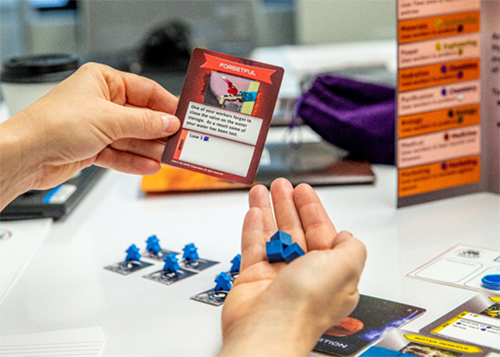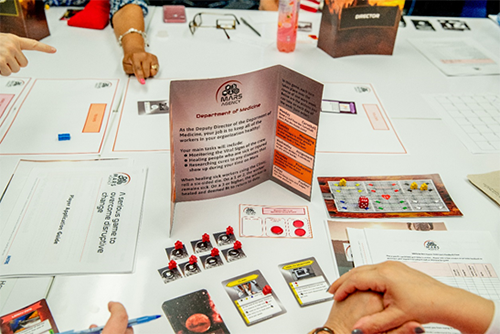A serious game enhances organizational agility

Immersed in MITRE’s MARS Serious Game, players learn organizational agility principles and behaviors as they work together to colonize the Red Planet. Photo credit: Jae Robinson
Author: Lisa Pacitto
Today’s environment is one of constant change and disruption. Government organizations are greatly impacted by new technologies, new laws and policies, administration changes, and customer expectations for increased services.
To carry out their missions and serve customers in this type of environment, government organizations must operate in a more agile manner and better manage constraints and demands. This new approach is called organizational agility—the ability to anticipate and respond to an environment quickly and effectively through sensing, interpreting, and responding routines.
That said, how do organizations empower their staff to learn a new approach for organizing to conduct work in a 21st-century environment?
“Play a serious game,” says Dr. Shelley Kirkpatrick, a MITRE Principal in Organizational Change Management.
Kirkpatrick and her team developed the MARS Agency Organizational Agility Serious Game, an engaging and hands-on game designed to teach organizational agility concepts and put them into immediate practice.
As the name might suggest, the object of the game is to successfully colonize the Red Planet—Mars. The challenge is for players is to work together, rather than compete with each other.
Instilling Organizational Agility Concepts and Behavior
Grounded in organizational agility literature and principles of Organizational Development and Industrial/Organizational Psychology, the MARS Serious Game is a table-top game that Kirkpatrick or one of her team members facilitates.
Developed under funding from MITRE’s Innovation Program (MIP), the game takes about half a day to play and provides players with the opportunity to experiment with innovative ways of organizing, communicating, and working in a risk-free, simulated environment.
“Just talking to people helps them understand organizational agility conceptually,” Kirkpatrick says. “But learning about agility experientially helps to instill the mindset and skills to find new ways to organize and carry out work.”
The MARS Serious Game is a complementary tool to the Government Organizational Agility Assessment (GOAA). Also developed under MIP funding, the GOAA provides government organizations with a means of defining and measuring current levels of agility and a framework for improving organizational agility.
In working with a large military organization recently, Kirkpatrick deployed the GOAA to over 2,000 participants to measure organizational agility.
“Using the assessment, organizations can see where they are today in terms of agility and gain better insight into how they can further increase their organizational agility,” Kirkpatrick says.
Depending upon an organization’s needs, one or both tools can be used to increase understanding of organizational agility principles and to identify actions to increase their organization’s agility.
Challenging Routine Behavior
This past August, Kirkpatrick and her team introduced the MARS Serious Game to participants working on MITRE’s McLean campus. During the informal event, more than 25 people, along with a group of young Marines, stopped by to inquire about the game and how it might be helpful for their sponsors.
“One of the Marines thought we were recruiting people for an actual mission to Mars,” Kirkpatrick says. “He seemed a little disappointed that wasn’t the case, but then realized learning and using organizational agility principles could help him survive on Mars should he ever go there.”
Changing, or rethinking, typical behaviors is a key outcome of playing the MARS Serious Game. Kirkpatrick has observed that players tend to portray their “default” behaviors [see sidebar] when playing the game, especially when certain issue come up or when under stress.
“We then coach and prompt them to try a different approach or rethink their response to a situation in a way that will help the team or organization be more agile,” Kirkpatrick says.
Since Kirkpatrick and her team introduced the MARS Serious Game to MITRE and its sponsors, they have received enthusiastic feedback from players.
It’s a very creative game. It’s fun and engaging–you don’t realize it’s actually “work.” This is way more effective than if you came and gave me a presentation on agility. —Sponsor participant
Safe way to step outside of “normal” behaviors; experiment with operations, observe results, repeat. —Participant
It’s a great game! And I learned a lot from the discussions. —Participant

Playing MITRE’s MARS Serious Game, participants must collaborate rather than compete, trying new approaches that will help their team or organization be more agile. Photo credit: Jae Robinson
While facilitating the MARS Serious Game, Kirkpatrick has seen the tendency for players to portray what she calls “default” behaviors—basically approaching a situation in the same way every time.
As the game facilitator, Kirkpatrick coaches players to try a different approach, one that will help their team or organization be more agile.
A few challenges player often encounter are:
- Delegation: Players in the Director role are often reluctant to delegate decisions and authority. Directors are represented through policy, communication, and culture cards that can be handed out to other players; however, directors often want to hang on to those cards. As part of the facilitated learning experience, players learn how a leader’s role is different in an agile organization than in a nonagile organization.
- Balance of Stability and Flexibility: The practice round introduces players to the game and simulates a stable environment. Once the game begins, curveballs and other events happen that disrupt stability and often distract players attention from the mission of building biodomes and sustaining life on Mars. Experiencing instability within a simulated environment provides players with a risk-free environment to develop real-world flexibility.
- Working Across Silos: Unlike typical board games where players compete to win, the MARS Serious Game is a cooperative game where players must work together to achieve the mission and balance resources. Many players use language or terms that reinforce silos, such as “this is MY department,” and “these are MY workers.” As players progress in the game, they realize they gain more by actually sharing resources.
- Morale and Coping with Ambiguity: People react to stress and ambiguity in different ways. When hit with unexpected events in the game, some players see it as a challenge or puzzle, while others get a bit frustrated. Some players may mentally check-out for a round or two, until another player does something to include them and get their head back into the game. As a game of cooperation, players learn that it takes the whole team to be successful.
For more information about the MARS Agency Organizational Agility Serious Game and the Government Organizational Agility Assessment, please contact Shelley Kirkpatrick, skirkpatick@mitre.org.
Strategic Communications Contract Writer Lisa Pacitto covers innovation and technology for MITRE. She handles external communications for the Innovation Seminar Series and MITRE’s Pepper robot, @mitrepepper. She has written for The Boston Globe and MIT’s Technology Review magazine.
© 2019 The MITRE Corporation. All rights reserved. Approved for public release. Distribution unlimited. Case number 18-03570-3
MITRE’s mission-driven team is dedicated to solving problems for a safer world. Learn more about MITRE.
See also:
MITRE Explores Emerging Tech of Interest at SXSW Conference and Hackathon
AI & Technology: Lending a Hand to People with Disabilities
A Spin Around the Blockchain—Exploring Future Government Applications
Applying Design Thinking to Boost Federal Agency Problem Solving
